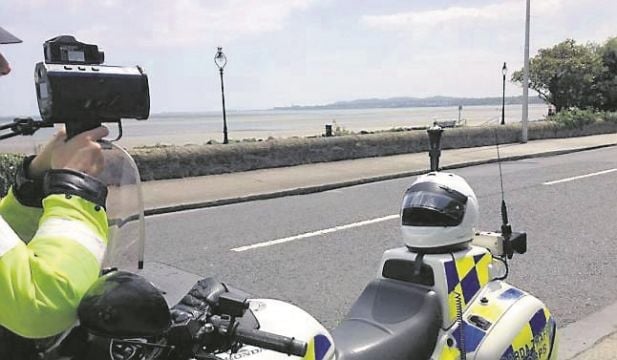A road safety group had expressed concern at new figures which show the number of fixed charge notices issued to motorists for road traffic offences has decreased by 14 per cent over the past three years at a time of rising road fatalities.
New figures published by the Department of Justice show almost 48,000 fewer fines were issued by gardaí last year compared to 2020 when a total of 331,410 motoring offences were detected.
The overall downward trend has been criticised by road safety campaign group, PARC, who noted the peak level of detections occurred at a time when traffic levels were greatly reduced due to travel restrictions imposed to tackle the Covid-19 pandemic.
PARC chairperson, Susan Gray pointed out that the annual number of road deaths had risen over the same period from 145 in 2020 to 184 last year – a 27 per cent increase.
So far this year, 126 people have died on Irish roads – one more than over the corresponding period in 2023.
The figures on motoring fines also reveal wide variations between different Garda divisions in the number of motorists caught for road traffic offences in recent years.
Detection rates have decreased across 17 of the 22 divisions nationwide since 2020 with the reductions most pronounced in Wexford/Wicklow where the number of fines issued has fallen by 41 per cent over the period.
Other divisions where the detection of offences has declined significantly include Dublin East (-39 per cent); Cork North (-39 per cent); Dublin West (-29 per cent) and Mayo/Roscommon/Longford (-29 per cent).
The number of fines for motoring offences issued by garda in the Clare/Tipperary division has risen by 51 per cent in the past three years, although the increase is understood to be largely due to the introduction of average speed cameras on a section of the M7 motorway in Tipperary in 2022.
The total number of 30,484 offences recorded in Clare/Tipperary was more than in any other Garda division last year.
The only other divisions where the number of motoring fines increased last year were Kerry, Dublin South Central, Sligo/Leitrim and Cork City.
The figures, which were provided in response to a parliamentary question from Aontú leader, Peadar Tóibín, relate to offences detected by both gardaí on mobile patrols and speed cameras.
Last year’s total of 283,516 fines being issued for road traffic offences was the lowest annual figure for a decade.
Over 34,000 motorists were caught using a mobile phone when driving in 2014 but the figure had fallen to just over 19,100 last year and is down 22 per cent since 2020.
The number of drivers fined for speeding in 2023 was 154,534 – down 15 per cent since 2020.
The figures show that the number of individuals fined for not wearing a seat-belt reached their lowest level for a decade last year at 5,477 – down 38 per cent since 2020.
However, the number of learner drivers caught driving unaccompanied peaked last year at 14,729 – up 20% over the same period.
Figures for more serious road traffic offences not dealt with by fines revealed the number of motorists caught for driving while intoxicated decreased by 13 per cent since 2020 to 6,754 last year
According to An Garda Síochána, any variation in trends can be due to many factors including overall traffic volumes, road user compliance levels and the number of garda in Roads Policing Units.
Other factors include enforcement levels, weather conditions and particular Garda operations.
However, Ms Gray said the trend identified by the latest figures suggested the decrease in the number of fines was linked to the increase in road fatalities over the same period.
“Enforcement really is the key thing in improving road safety but we had figures published recently which showed numbers in Roads Policing Units are at their lowest level in years,” said Ms Gray.
The latest available figures show the total number of gardaí in such units fell to 620 in May – the lowest level since 2009.
Ms Gray said 75 additional gardaí had been promised for Roads Policing Units this year, but there was no sign yet of any being appointed.
“The Taoiseach, Simon Harris, claims road safety is a priority for his government, but we still have to see hard evidence of that as the lack of urgency in boosting the numbers attached to Roads Policing Units is alarming,” she added.
Preliminary figures for this year show 150,499 fixed charge notices were issued to motorists up to July 15th 2024 – which would indicate a similar overall number to last year.
However, they reveal a sharp increase in the number of motorists caught for using bus lanes and parking on clearways and in disabled parking bays
Other offences where there have been significant increases in the issuing of fines include unaccompanied learners driving, breaking traffic lights, parking too close to corners and not having tax or insurance.
The Minister for Justice, Helen McEntee, said road safety was a shared responsibility which the Government takes very seriously.
“We have all been shocked by the recent loss of life on our roads and concerned by the recent worrying increase in road fatalities after many years of progress in making our roads safer,” said Ms McEntee.
The Minister said road traffic legislation was enforced as part of the day-to-day duties of gardaí as well as through a programme of high visibility road safety and enforcement operations in order to make roads safer for all.
She pointed out that all frontline gardaí and not just those attached to Roads Policing Units played a role in enforcing road traffic legislation and that all gardai have been required to carry out 30 minutes of high visibility roads policing per shift since April.
“The aim of this activity is to increase Garda visibility which has the effect of moderating driver and road user behaviour,” said Ms McEntee.
She noted there was a 27% increase in breaths tests over an eight-week period as well as a 69 per cent increase in drug tests since the change compared to a similar timeframe just before the direction to gardaí to increase roads policing enforcement levels.
Ms McEntee said there had also been a 29 per cent increase in fixed charge notices for using a mobile phone while driving and a similar five per cent increase for speeding.







